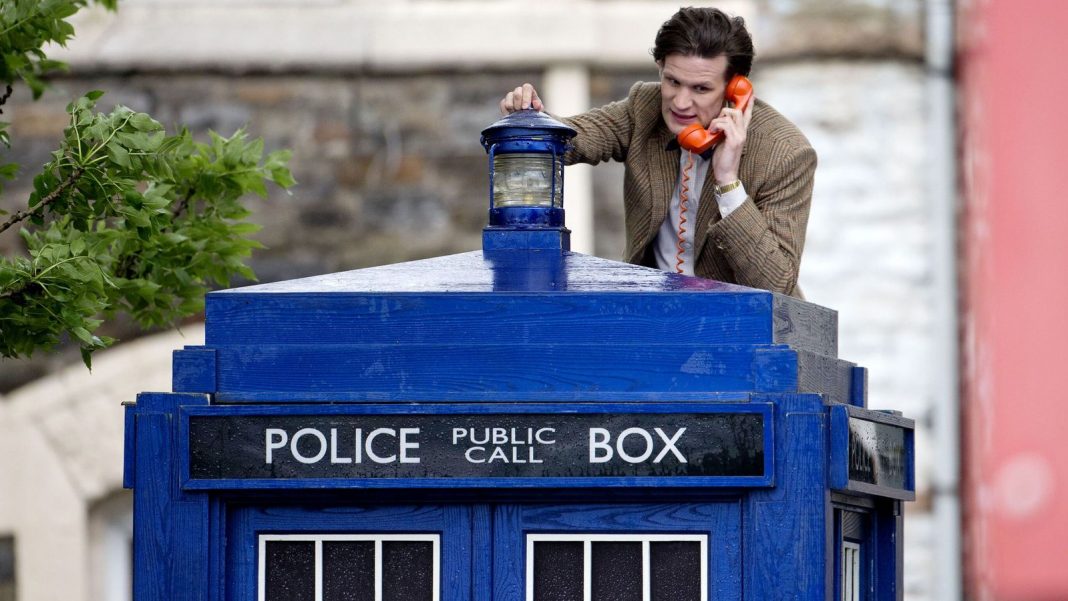For 60 years, Doctor Who has travelled through time and space.
But now, the long-running science fiction series has found its home in Cardiff.
First launched in November 1963, the show was axed in 1989 until (bar a TV movie in 1996) it made a comeback in 2005 after television writer Russell T Davies was tasked with reviving the series for a modern audience.
With the BBC looking to produce more shows outside London at the time – and with Davies himself from Wales – Cardiff seemed a good fit, and production moved to BBC Wales.
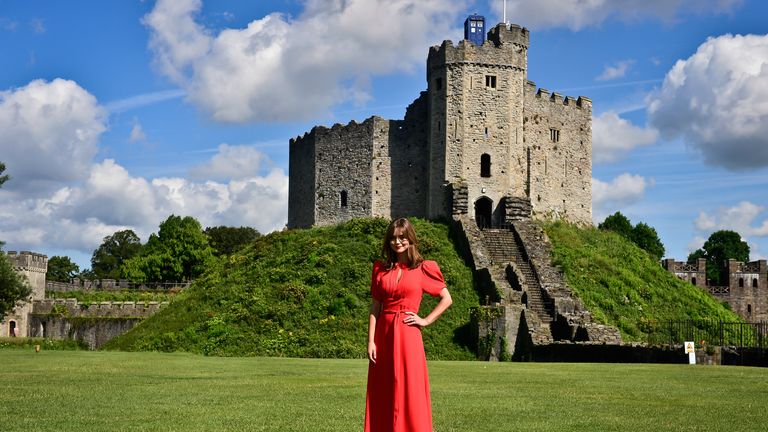
Spot the Tardis: Jenna Coleman, who played the Doctor’s companion Clara Oswald, pictured outside Cardiff Castle in 2014
Since then, Doctor Who has starred Christopher Eccleston, David Tennant, Matt Smith, Peter Capaldi and Jodie Whittaker as the Time Lord, and found a new generation of fans. Tennant and Catherine Tate, who played his companion Donna Noble, are returning for three special episodes as part of the 60th anniversary later this month, before Sex Education’s Ncuti Gatwa makes his first full appearance as the 15th Doctor over the Christmas period.
Thanks to its revival, the show’s global appeal has acted “as a catalyst for the growth of the screen industry here in Wales”, the Welsh government says, attracting visitors to filming locations including Cardiff Bay and Cardiff Castle, creating jobs, and generating millions for the country’s economy.
Annette Badland, who appeared in the first series of the revived era, told Sky News she had been “very lucky” to be involved with the show’s comeback.
Her episodes as villainous Margaret Blaine, who was really a member of the alien Slitheen family, were the first to be filmed in Cardiff. After her two-part debut, writer Russell T Davies devised another episode, titled Boom Town, which saw the character return – this time as the new mayor of the Welsh capital.
‘Cardiff is on the map – but not at that time’
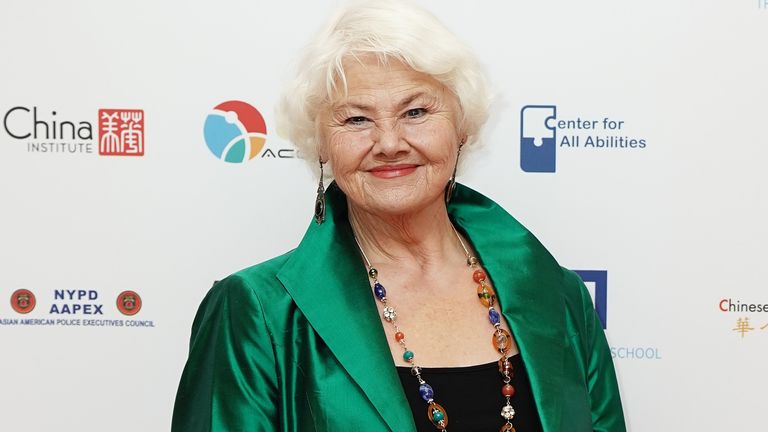
Annette Badland pictured in 2022
“He wrote Boom Town for me which was a wonderful gift and wasn’t part of the initial plan,” Badland said. “Of course nobody knew if the fans would accept this new series. It was made with love and hope.”
The actress, also known for EastEnders, Bergerac, Ted Lasso and Midsomer Murders, said Cardiff provided a “fantastic” location for filming.
“It was done with a great deal of heart and knowledge and, being in Cardiff, it made its own world and there are fabulous buildings, there’s lots of stuff to be used there,” she said.
“So it felt very much its own entity, it felt separate, it was a new venture and to be somewhere other than all the usual venues. I mean Cardiff now is well on the map but at that time it wasn’t, really.”
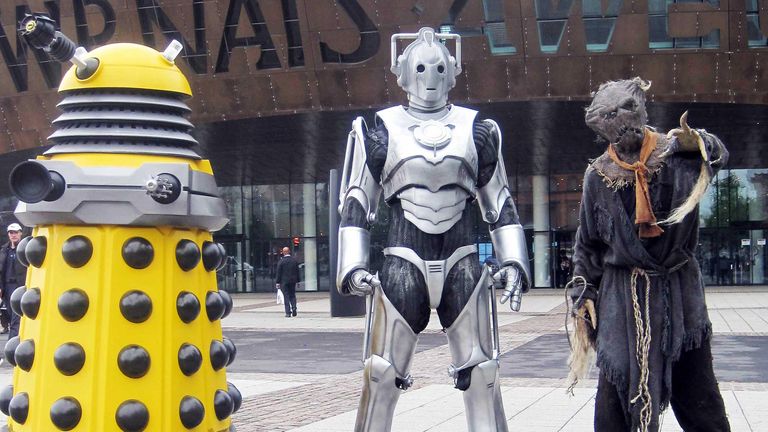
A dalek, a cyberman and a scarecrow promote the Doctor Who Experience in Cardiff Bay
While there may have been some pressure to relaunch the show for a 21st century audience, it was mainly “enthusiasm” from the cast.
“The writing was so good, so as an actor you respond to that, you relish that,” Badland said. “But we made it with great enthusiasm and hope, and I guess dedication more than fear, just trying to get it right.”
For many Doctor Who fans, the revived era of the show is all they’ve ever known.
“I met someone recently who said, ‘You’re in the early episodes’, meaning the recreation,” Badland said. “Someone’s 19 or 20, for them that’s the old stuff now, which is extraordinary because, of course, I started with William Hartnell.”
‘Doctor Who is a family’

Janet Fielding pictured in 1980, shortly before she became a Doctor Who star
One cast member who has worked on both the revived and classic eras of the show is Janet Fielding.
She first joined the cast as Tegan Jovanka in 1981, a companion of both the fourth and fifth Doctors, played by Tom Baker and Peter Davison respectively.
More recently, Fielding reprised her role for a special episode alongside Jodie Whittaker’s thirteenth Doctor. Returning to Doctor Who, this time in Cardiff, was a full circle moment for the actress.
“I was on tour with a show in Cardiff when I got the job in 1980,” she said. “It’s changed enormously. The whole way of doing it is different. And it was during COVID so we didn’t even have a read-through.”
Fielding is optimistic for the show’s future far beyond its 60th anniversary.
“I’m here to tell you that it will probably go to 100 years and at the 100-year point there will be somebody from Peter Davison’s family or extended family in the show,” she said.
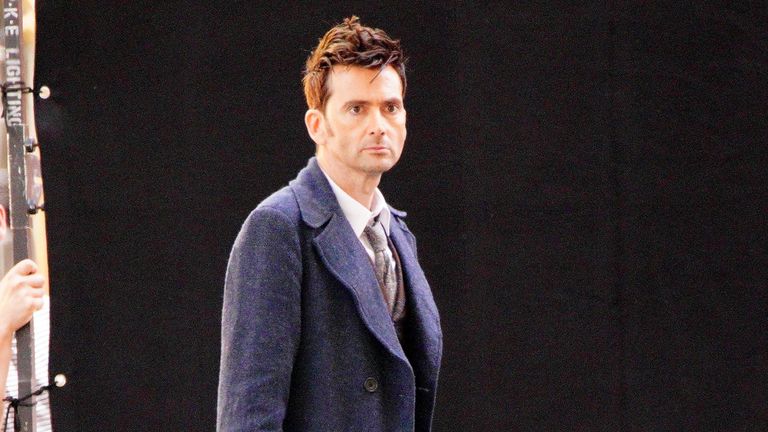
David Tennant has reprised his role for Doctor Who’s 60th anniversary specials
Davison is the father-in-law of tenth Doctor actor David Tennant; his daughter, Georgia Moffett, played the Doctor’s on-screen daughter in an episode in 2008.
“Doctor Who is a family, it really is a family, and it’s fabulous to think of the way in which we support each other,” Fielding added. “It’s a huge privilege to be a treasured part of so many people’s childhood and adolescence and then their adulthoods.”
‘I burst into tears when I got the call’
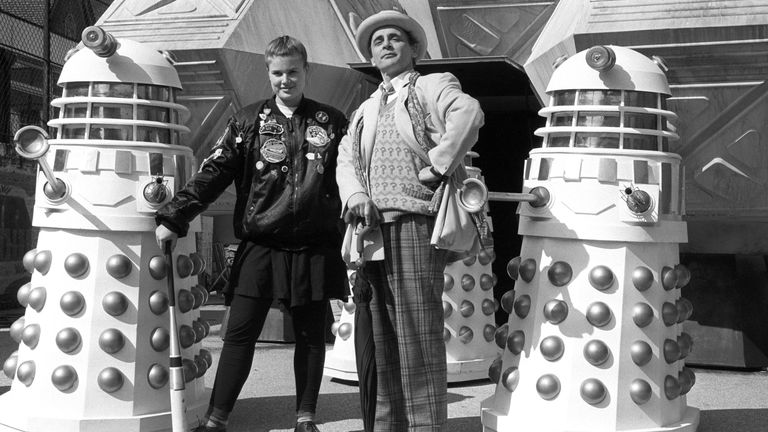
Sophie Aldred and Sylvester McCoy as Ace and the Doctor
Sophie Aldred first appeared as Ace alongside Sylvester McCoy’s Doctor in the 1980s and starred in the final episode of the original run when the show was cancelled in 1989.
“I was very sad because it was such an institution and I was feeling for the fans as well because by that time I’d done a lot of conventions and met a lot of fans and they were absolutely heartbroken,” she said.
“On the other hand, as an actor, you get used to doing a job, moving on, doing the next thing and it was more I felt for the fans who were bereaved for many years.”
Like Fielding, Aldred returned last year. The call from her agent was a “dream come true”, she says.
“I burst into tears because I think it was a sort of dream I didn’t know I had for all these years, and I knew how much it would mean for fandom.”
Aldred said she “absolutely loved” filming in Cardiff.
“Janet and I were skulking around Cardiff, disguised, because we couldn’t give the secret away that we were down there,” she said.
“Meanwhile, when the Doctors came round, they went out for a meal together in a hotel in Penarth and a waiter asked if he could take a photograph of them and they were suddenly all over social media.
“So honestly, those naughty Doctors. We’d been careful as anything and they nearly blew it.”
Read more:
Sex Education star ‘honoured’ to be new Doctor
New Doctor Who companion unveiled as Coronation Street star
And what if the opportunity came to return to the series again?
“Never say never, but I would be delighted, I’d go back like a shot.”
For now, we wait to see what the next Doctor has in store, perhaps for many more decades to come. Wales would certainly be happy to keep the Time Lord.
“The Doctor’s return has acted as a catalyst for the growth of the screen industry here in Wales, and the Welsh government and Creative Wales have been pleased to work with the sector to build on that success,” a spokesperson says.
“Penblwydd Hapus to the Doctor – here’s to the next 60 years!”


